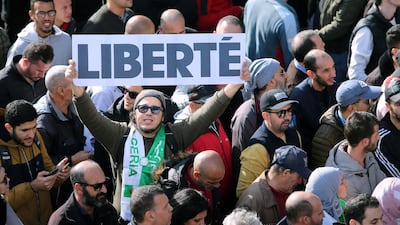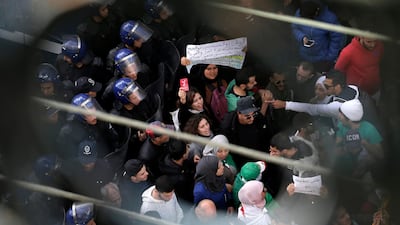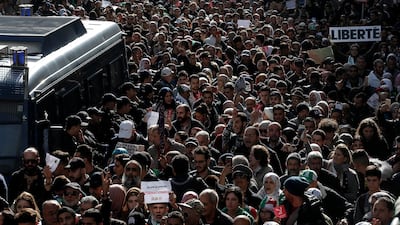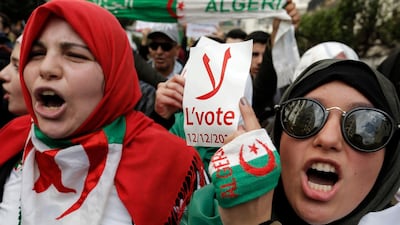Algerians took to the streets of their capital on Wednesday, demanding that this week's presidential election be cancelled and not held until the country's ruling elite steps down and the military quit politics.
Thousands of people marched through the capital and chanted, "No election tomorrow" and held up banners reading "You have destroyed the country".
Algeria's political stalemate between the enormous protest movement and a state increasingly dominated by the military has put at stake the political future of Africa's largest country, a nation of 40 million people and a major gas supplier to Europe.
All five of the state-approved candidates running on Thursday are former senior officials linked to the former president Abdelaziz Bouteflika whom the army forced aside in April in response to the protests.
"Algerians want radical change. They are fed up," said student Ahmed Kamili, 25, wrapped in the national flag.
In the Kabylie region, the fiercest arena of the 1990s civil war between the state and extremist insurgents, almost all businesses and government offices are closed in a general strike in support of the protesters and against the election.
"The baker and pharmacy are the only open shops in the village," said Mezouane Azouz, a resident of Haizer in the Kabylie region.
Army chief Lt Gen Ahmed Gaed Salah, who has emerged as Algeria's most powerful political player since Bouteflika was ousted, has pushed for Thursday's vote as the only way to resolve the political crisis.
Two former prime ministers and other senior figures were jailed for corruption on Tuesday in an apparent effort to mollify protesters.
Although the election is unlikely to bring political change, it could become a pivotal moment in the struggle between the protesters and the army, testing the patience of both sides in Africa's biggest country, an important gas supplier to Europe.
The protesters believe the army will continue to wield power behind the scenes after consolidating its position in the hierarchy by purging once untouchable rivals.
Lt Gen Gaed Salah's old rivals in the security department have also been detained in a deep cleansing of the ruling structure by the army, settling an internal power struggle.
Scores of demonstrators have been arrested. Opposition figures, journalists and even a satirical cartoonist have also been held for "undermining army morale", and human rights groups have warned of a growing crackdown on the protesters.
Any shift after the election towards a more violent settlement of the political struggle could be disastrous.









